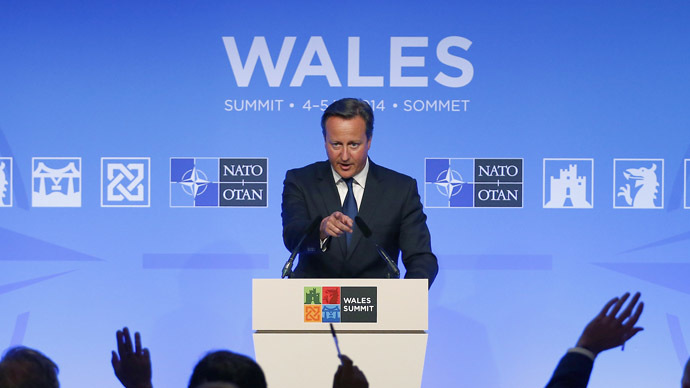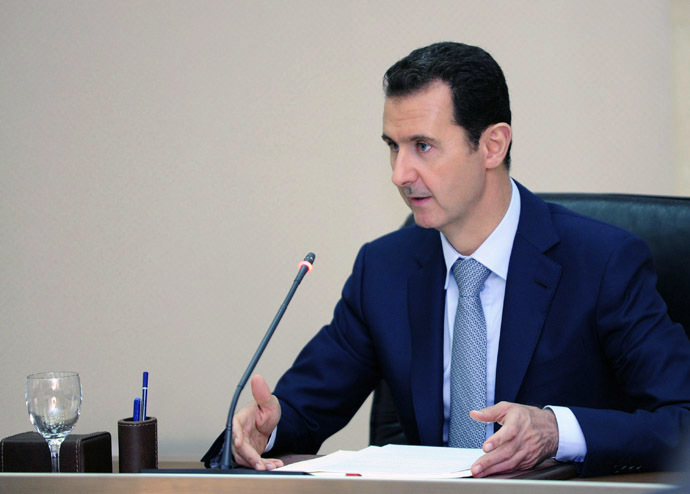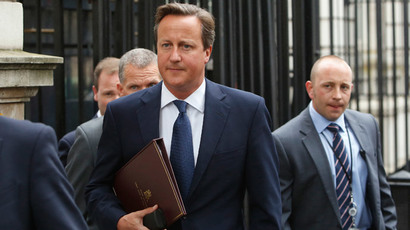‘Cameron must cooperate with Putin and Assad to defeat ISIS’ – former defense chief

Lord Richards, a former British defence chief, has advised David Cameron to form an unlikely alliance with Assad’s Syrian regime, Moscow and Iranian authorities to defeat Islamic State (IS) militants.
The former head of the British Armed Forces, who retired from the post in 2013, broke his silence on the prime minister’s failure to employ his strategic plan of containing President Bashar Assad along with fundamentalist militants in the region.
Lord Richard’s spoke on BBC Radio 4’s Today Programme on Friday as global allied NATO leaders discussed tactical maneuvers to defeat IS militants in Iraq and Syria.
On the question of whether the British government should form an alliance with the Assad regime in an effort to contain bloodshed and violence being committed by the Islamic State, Richards said:
"My judgment is that you do have to come to some accommodation with them. Russia, ironically could play a very important role in that and Iran too.
"There are the bones for a grand strategic solution to the Middle East here, if we can get together with people who we viewed as rather hostile."
The former defense chief emphasized he created a specially tailored contingency plan to bring about the demise of the Assad regime two years ago, which entailed the training of 100,000 rebel fighters to oppose fundamentalist Islamist groups in Syria.
"Back in 2011/12, as was my job, I did offer a coherent military strategy to deal with that. I think it was more than the market would bear, people did not realize the significance of what was happening in Syria at the time and no one really realized that Isis could grow into the hydra that it has," he said.
While Britain’s military often creates contingency plans for varying scenarios infiltrating the global stage, Richards’ was reportedly given deeper consideration than many. The strategic proposal was circulated to No. 10 and several elite US military officials. But the British government resolved the tactical ploy was simply too risky and the proposition was shelved.

Richards acknowledged the West is making some progress in containing IS militants. He told BBC radio 4, however, that NATO allied states must work with other governments and regimes if they are to tackle extremist forces in Afghanistan, Jordon, Turkey and throughout Kurdish regions.
He also suggested a more comprehensive long-term strategy to thwart the rise of extremist Islamic groups in the Greater Middle East and elsewhere is imperative.
"This is happening all over the world and needs to be the first stage in a grand strategic plan to once and for all deal with Muslim extremism in places such as Nigeria, Kenya, Somalia, Yemen, Pakistan, and now we hear in Myanmar."
Richards’ suggestion that Britain should form an alliance with the Assad regime echoes proposals made earlier this month by several MPs who called for the UK government to work alongside the Syrian president to defeat IS militants.The fundamentalist Islamist group has reportedly killed thousands in Syria and Iraq.
Sir Malcolm Rifkind, one of the UK’s most senior MPs, told the Financial Times (FT) in August the horrific murder of American journalist, James Foley, highlighted the urgent need to take action against the Islamic State (IS, formerly ISIS/ISIL), whose swift rise to power in the Middle East had, until recently, remained largely unchecked by Western intervention.

In recent times, the Assad government has increased its efforts to defeat the Islamic State following months of relative passivity. But many Western political analysts and critics view this resurgence in military activity as a tactical maneuver to regain leverage over the region.
Countering Richards’ views at the NATO summit in Wales on Thursday, Prime Minister David Cameron said Britain does not require permission from President Bashar Assad to conduct airstrikes against IS militants. Cameron added he did not recognize Assad as a legitimate leader, declaring the autocrat to be “part of the problem.”
While Britain’s Foreign Secretary has attempted to dampen expectation of imminent UK air strikes against the Islamic State – stressing no such plans are being drawn up – he insists the British government will not refrain from undertaking such action if necessary, even if it further threatens the lives of British hostages.
Cameron has called for NATO states to join Britain and America to tackle IS militants, emphasizing the West cannot be “cowed by barbaric killers.”














